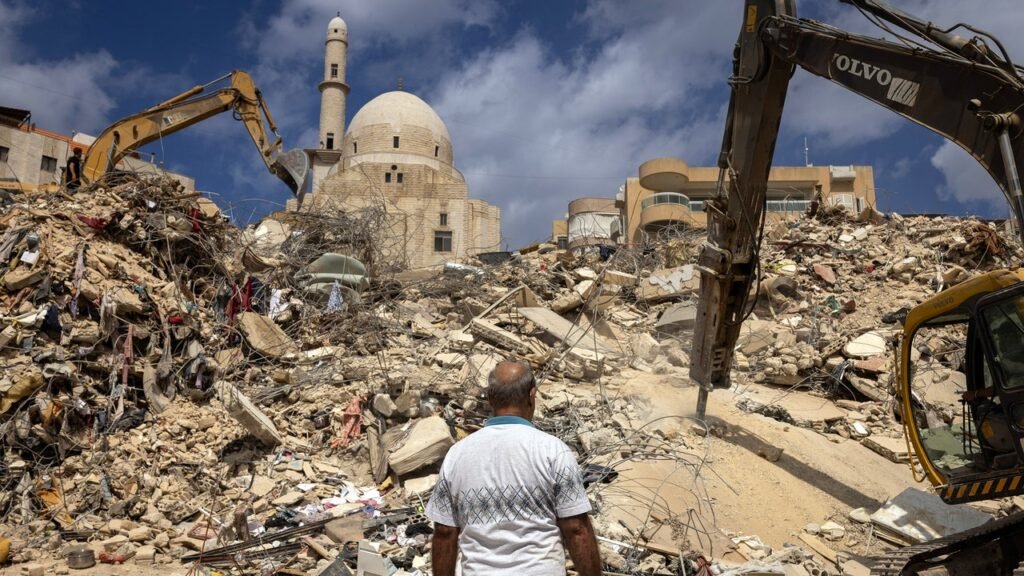Why Netanyahu Received’t Stop Fireplace

Israeli troops at the moment are combating to rid Hezbollah cadres and infrastructure from the realm between the Lebanese border and the Litani River, about eighteen miles north; on Tuesday, Netanyahu appeared to verify in a video {that a} bombing raid in Beirut had killed Hassan Nasrallah’s obvious inheritor, Hashem Safieddine. The I.D.F. claims not solely to have decimated the Hezbollah management but additionally to have killed lots of of Hezbollah fighters. However, as in Gaza, large air assaults on Hezbollah’s strongholds in Beirut, and on a Palestinian refugee camp, have produced civilian distress. Greater than two thousand have died and a few ten thousand have been injured, a lot of them noncombatants. Greater than 1.2 million civilians have been displaced.
Hezbollah is liable for much more bloodshed in Syria, the place it has propped up Bashar al-Assad, than in Israel, and plenty of Arabs would be part of Israelis in eager to see it disarmed. Nonetheless, Nasrallah, earlier than his loss of life, had brazenly claimed that Hezbollah would cease firing on Israel if a ceasefire had been achieved in Gaza, which appeared prone to open the door to a diplomatic settlement. Ehud Olmert, who was Prime Minister in the course of the 2006 struggle with Lebanon, advised me, again in February, that he believed {that a} revision to U.N. Safety Council Decision 1701—which ended that struggle and organized for a peacekeeping power, UNIFIL, to patrol areas south of the Litani, which Hezbollah evacuated—may need served as a steady association. (The revision would see Israel ceding to Lebanon a small territory, the Shebaa Farms, captured from Syria however claimed by Lebanon; Hezbollah might current this as a diplomatic victory.) If Hezbollah would agree to drag again from the Litani once more, with augmented U.N. inspection, Olmert advised me extra lately, then “1701 envisions an inexpensive compromise” that will additionally “enable Israelis to return to their houses and likewise cease the combating.”
Olmert is assuming that, finally, there must be a diplomatic settlement; surprising air assaults might produce, initially, an aura of “deterrence” but additionally extra enduring hatred. And the brand new leaders of Hezbollah, holding 1000’s of rockets and missiles in reserve, can’t be saved out of the equation; greater than 100 and thirty penetrated Israeli airspace on Monday, with some touchdown in Haifa, injuring ten. “In 1992, when Israel assassinated Sayyed Abbas Musawi, the then chief of Hezbollah, American and Israeli newspaper headlines claimed that his assassination marked the start of the top for Hezbollah,” Seyed Hossein Mousavian, a former Iranian Ambassador to Germany—who, in 2004, was the spokesperson for the Iranian negotiating workforce on nuclear enrichment—advised me. “Nevertheless, fourteen years later, within the 2006 struggle, Israel was, in impact, stalemated, and the world was shocked by Hezbollah’s new energy. The assassination of Hassan Nasrallah, [the Hamas political leader Ismail] Haniyeh, and different commanders of Hezbollah and Hamas will spark the rise of a brand new technology of resistance, much more highly effective and decided than at the moment.” Lots of Hezbollah’s jihadist forces, Mousavian mentioned, misplaced relations in earlier conflicts.
Mousavian is at the moment a visiting scholar at Princeton and no buddy of the present Iranian regime. (By 2005, he had come into battle with hard-liners led by Mahmoud Ahmadinejad, and can’t now return with out risking jail.) But he sees a diplomatic alternative for Iran right here, too. “The brand new Iranian President, Masoud Pezeshkian, got here to the U.N. three days earlier than Netanyahu, and spoke of a ‘new period,’ ” Mousavian mentioned, “with Iran taking part in ‘an efficient and constructive function within the evolving international order.’ ” Pezeshkian’s is just not the one voice; Iran’s Islamic Revolutionary Guard Corps is gathering political and financial energy. However, “relations with Israel undergo Washington,” Mousavian mentioned, and Pezeshkian’s supply must be examined. “The U.S. ought to open a broad dialogue, through which bilateral and regional points are all on the desk—together with a renewed nuclear deal, a denuclearized Persian Gulf, ceasefire between Israel and Iran, a regional conventional-arms association, and the safety of the Persian Gulf.” He added, “I consider that Iran would respect a Palestinian resolution, and if the Palestinians are on a pathway”—to a two-state answer—“then Iran wouldn’t impede or disturb it.”
Maybe Netanyahu’s most disquieting elision in his U.N. speech, on this season of atonement, is that Moses’s admonition to decide on blessings over curses was aimed particularly on the Kids of Israel. The paramount sin, in keeping with Moses, was idol worship, to “go after different Gods to worship them.” In up to date Israel, the idol, mockingly, is the promised land itself. Netanyahu’s technique, if that’s the phrase for it, is de-facto annexation underneath an umbrella of deterrence. However, absent diplomatic agreements and regional alliances, deterrence appears certain to turn out to be a everlasting curse. Then, as Moses warned, “the Lord will trigger you to be defeated earlier than your enemies. You’ll come at them from one path however flee from them in seven, and you’ll turn out to be a factor of horror to all of the kingdoms on earth.” ♦





